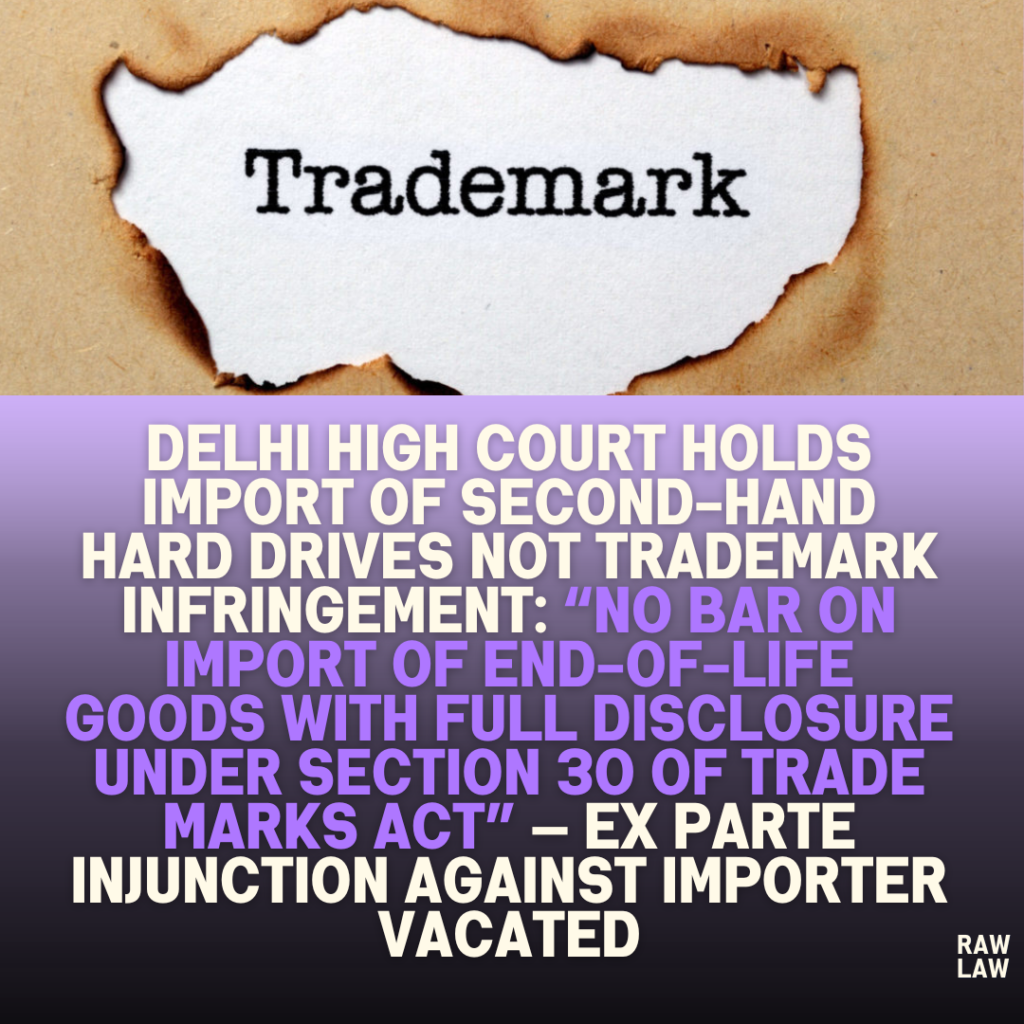Court’s Decision
The Delhi High Court vacated the ex parte ad interim injunction previously granted against the defendant in a trademark infringement suit initiated by the plaintiffs, Western Digital Technologies, Inc. and its subsidiary. The Court held that there exists no statutory bar against the import of second-hand or refurbished goods, and that such import is permitted under the principle of international exhaustion enshrined in Sections 30(3) and 30(4) of the Trade Marks Act, 1999. The Court ruled that the goods, which had been lying with customs authorities since seizure, may be released to the defendant, provided they are sold only as scrap after removing the plaintiffs’ trademarks.
Facts
The plaintiffs, global manufacturers of storage devices, initiated a suit against the defendant for importing large quantities of hard disk drives (HDDs) allegedly infringing their registered trademarks ‘WESTERN DIGITAL’ and ‘WD’. On 21st October 2019, the Court had passed an ex parte injunction restraining the defendant from dealing in such goods and had appointed a Local Commissioner to seize the HDDs. About 7,500 HDDs were seized and have since been in custody at the customs warehouse. The defendant moved to vacate the injunction, relying heavily on a recent judgment in Seagate Technology LLC v. Daichi International.
Issues
- Whether the import of second-hand or refurbished goods bearing a registered trademark amounts to trademark infringement.
- Whether the judgment in Daichi International applies to the present case involving a direct importer.
- Whether the defendant is entitled to benefit under Sections 30(3) and 30(4) of the Trade Marks Act.
- Whether the goods can be released despite the initial injunction.
Petitioner’s Arguments
- The drives were not intended for retail and were custom-manufactured for OEMs, making them incompatible with other systems.
- Technical analysis showed that some HDDs were non-functional and others were used, yet the defendant planned to sell them as new.
- Import of such goods infringes the plaintiffs’ trademarks under Section 29(6), and they were not “lawfully acquired.”
- The Daichi judgment was inapplicable as it involved resellers, not importers.
- Relied on Kapil Wadhwa v. Samsung Electronics to argue impairment defeats protection under Section 30(3).
Respondent’s Arguments
- Relied on Daichi, arguing import and resale of genuine goods is permissible under international exhaustion.
- The defendant never tampered with or sold the goods; they were seized at customs.
- Plaintiffs failed to prove any actual market confusion or damage.
- Defendant expressed willingness to comply with disclosure norms for resale.
- The Xerox Corporation case also supports resale of second-hand goods with adequate disclosures.
Analysis of the Law
The Court affirmed that Sections 30(3) and (4) of the Trade Marks Act recognize the principle of international exhaustion. It held that once goods are legitimately put in the market, the trademark holder cannot object to subsequent sales unless the goods have been impaired. Section 29(6), which addresses import-based infringement, must be read subject to these exceptions.
The Court distinguished between impairment and simple resale. It stated that if the goods are sold with full disclosure and without misleading branding, the rights of the trademark owner are not violated.
Precedent Analysis
- Kapil Wadhwa v. Samsung Electronics Co. Ltd.: Recognized international exhaustion and allowed resale with proper disclaimers.
- Daichi International: Extended Kapil Wadhwa to refurbished goods, affirming resale with proper disclosure is not infringement.
- Xerox Corporation v. Shailesh Patel: Settlement allowed import and resale of used machines with stringent disclosure conditions.
The Court observed that Daichi involved importers, contrary to plaintiffs’ claims, and upheld its applicability.
Court’s Reasoning
- Defendant did not bring the goods to market, and thus no actual misrepresentation occurred.
- No law bars import of second-hand goods, and plaintiffs provided no agreement with OEMs prohibiting resale.
- Section 30(3) allows lawful import and resale of trademarked goods unless impaired.
- Daichi and Kapil Wadhwa provide sufficient precedent for allowing such imports with full disclosure.
Conclusion
The Court permitted release of seized goods to the defendant on the condition they be sold only as scrap after removal of the plaintiffs’ trademarks. It allowed future imports and resale of second-hand goods by the defendant, subject to compliance with disclosure norms laid down in Xerox Corporation (for direct resale) and Daichi (for refurbished goods).
Implications
This judgment significantly impacts the enforcement of IP rights in the context of parallel imports and the refurbished goods market. It reinforces the principle that trademark rights do not extend to second-hand goods sold with full disclosure. It also provides clear compliance parameters for future importers and refurbishers of branded products in India.




Pingback: Bombay High Court Holds Suit Challenging 1972 and 1975 Sale Deeds Filed in 2022 Is Hopelessly Time-Barred—“Cause of Action Pleaded Is Illusory and a Product of Clever Drafting; Plaintiff Had 43 Years to Sue After Attaining Majority” - Raw Law
Pingback: Delhi High Court Quashes FIR Alleging Cheating and Criminal Breach of Trust Amidst Amicable Settlement Between Homebuyers and Real Estate Company: “No Useful Purpose Will Be Served in Continuing with the FIR” - Raw Law